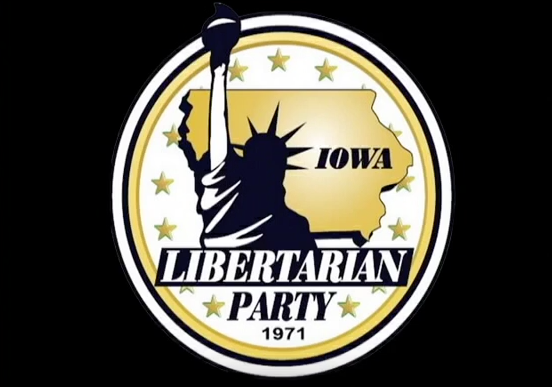Unofficial results from Tuesday’s election show Libertarian presidential nominee Gary Johnson received 58,796 votes in Iowa, about 3.8 percent of ballots cast.
Before this year, the most successful Libertarian ticket in Iowa gained 1 percent of the vote, way back in 1980. Although Johnson wasn’t able to maintain his much higher polling numbers from the late summer, he more than quadrupled his 2012 raw vote total and share of the vote here.
The result gives the Libertarian Party full “political party status” in Iowa. What does that mean in practical terms?
Iowa Code defines a political party as “a party which, at the last preceding general election, cast for its candidate for president of the United States or for governor, as the case may be, at least two percent of the total vote cast for all candidates for that office at that election.” After clearing that bar, a non-party political organizations can apply for political party status and keep it as long as its candidates for president or governor continue to receive at least 2 percent of the vote.
The Green Party was the last political organization to become a party in Iowa, after Ralph Nader won 2.2 percent of the statewide vote in the 2000 presidential election. However, the Greens lost that status after a little less than 1.5 percent of Iowans voted for Green gubernatorial candidate Jay Robinson in 2002. In recent election cycles, Greens have made almost no effort to build a party organization here. This year, no Green candidate aside from the presidential ticket filed in any Iowa race.
The Secretary of State’s website explains the biggest benefit from moving up to full party status:
Political party candidates may circulate nomination petitions to have their names placed on the Primary Election ballot. The Primary Election is held prior to the General Election, and winners of the Primary will have their names placed on the General Election ballot. Political parties may also nominate candidates for the General Election (if no candidate was nominated at the Primary Election) by holding nominating conventions.
Libertarians plan to make the most of that advantage. From a November 9 press release:
Iowa voters have acted, giving 4% of their votes to Presidential Libertarian Party candidate Gary Johnson. This is exceeds the 2% of votes needed for the State of Iowa to recognize the Libertarian Party as a full-status political party. Iowans will see the difference in the 2018 primaries.
“Voters ask us why they don’t hear about Libertarian candidates until late in an election,” said Campaigns and Elections Chair James Schneider. “Our candidates have been campaigning for months, but they have not been allowed to file their candidacy papers until August – and often the media and polls do not acknowledge a candidate until papers are filed.” As a Political Party, Libertarians will now be able to file for office before primary elections.
State Party Chair Keith Laube said, “We thank our candidates, dedicated volunteers and party members. They helped to inform voters about Libertarian values of personal freedoms and a smaller more efficient government, while caring for families and small businesses.” Mr. Laube added, “With the Libertarian Party obtaining political party status, the 2016 general election was a win for Iowa citizens. In the future there will be more ideas regarding the issues and less time spent on partisan politics.”
John Deeth, who works in the Johnson County auditor’s Elections Office, noted on his blog,
The signature levels for a just barely big enough to qualify party to get its candidates on the ballot in Iowa are minuscule, and primary turnout is likely to be just as minuscule. My county had 44 voters in the last third party primary, for the Greens in 2002. The practical effect is a lot more printing costs and testing time for auditors, for ballots few people will use.
The biggest challenge for Iowa Libertarians now will be maintaining a large enough share of the vote to keep their party status. Johnson benefited from unusually high unfavorable ratings for this year’s Republican presidential nominee. The next GOP candidate for governor may not be so disliked by Republicans with a libertarian bent.
Nearly 10,000 registered voters in Iowa currently align with the Libertarian Party. The last Libertarian candidate for governor, Dr. Lee Hieb, won 20,321 votes (nearly 1.8 percent) in 2014, an improvement on the 14,398 votes (1.3 percent) for Eric Cooper in 2010.
Jake Porter, who was the party’s nominee for secretary of state the last two midterm elections, has been running for governor for some time. (Hieb is chairing his campaign.) He will need between 22,000 and 25,000 votes to clear the 2 percent threshold in 2018.
Iowa Libertarians nominated candidates for Iowa’s U.S. Senate seat and for the U.S. House in the third Congressional district, as well as in six Iowa Senate and twelve Iowa House districts this year. Recruiting as many state legislative candidates as possible, especially in heavily Republican areas where Democrats often don’t run, should be a high priority going into the 2018 election cycle.

